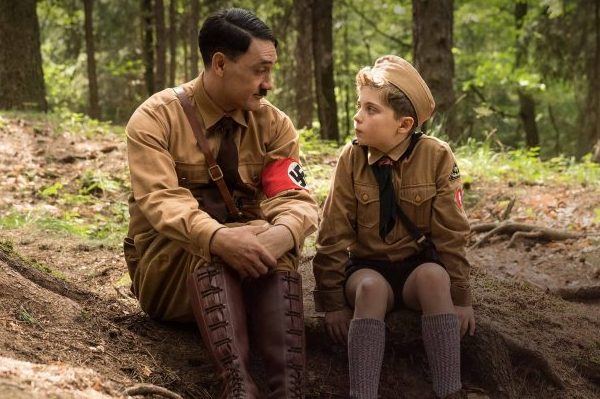That’s right, we said it. Jojo Rabbit brings Adolf Hitler back in the best way possible – to remind us how fallacious and half-witted his ideologies actually were. Most World War II films tend to steer away from depicting Hitler because, well, he’s probably the most reviled person ever to walk the face of the Earth. So when it was first announced that Taika Waititi’s follow-up to Thor: Ragnarok would be a WWII satire with the actor and director playing a comedic version of Hitler, it naturally raised eyebrows throughout Hollywood.
Jojo Rabbit follows a 10-year-old boy who is an enthusiastic member of the Hitler Youth that frequently converses with his imaginary version of Hitler. When Jojo discovers that his mother is secretly sheltering a young Jewish girl, his entire belief system is tested. In an era of history where violence, corruption, and hatred seem to be a prevailing factor in the current state of the world, Jojo Rabbit serves as in meaningful and relevant reminder about the circular nature of history. And it’s all thanks to the brilliant and tactful approach of writer-director-producer-actor Wiatiti. Here’s how he made it work.
Cover Photo: Fox Searchlight
Critical darlings: 10 Incredible Indie Movies You Might’ve Missed This Year
Wish list: Flash Gordon Is the Latest Ridiculous Reboot (But Taika Waititi Could Spike It)
Follow Mandatory on Facebook, Twitter, and Instagram.
Jojo Rabbit
-
Satirizing Nazis

Although Jojo Rabbit feels like a reaction to the current state of society, Waititi first began writing the screenplay back in 2011. Based on Christine Leunens’ 2004 novel Caging Skies, the source material was primarily a dramatic concept that the comedic filmmaker found tricky to tackle, in part due to his hatred for Nazis. The real breakthrough came when the filmmaker, ironically, decided to add a new element to the story – the inclusion of Jojo’s imaginary friend in the form of Hitler. As it turns out, this is precisely the element that makes Jojo Rabbit as powerful as it is. However, it’s also the reason why no one had the balls to make it until now.
-
Reframing Hitler

As Waititi’s success began to grow in Hollywood, Fox Searchlight eventually signed on to the project, albeit with one condition – Waititi himself would be the one to play Hitler. While the filmmaker is of both Māori and Russian Jewish heritage, he was reluctant to don the mustache and blue contacts. Earnestly speaking, Waititi is the only filmmaker in the world who could pull a premise like Jojo Rabbit off successfully. Waititi’s voice is so specific as a filmmaker that the satirical elements of the story only work if they’re expressed through his own moral barometer. In other words, it’s a powerful message that could have been handled poorly had anyone else played Hitler in this movie. As a result, the filmmaker is able to craft a light and playful tone that never forgets the gravity of its subject matter.
-
Opposing Viewpoints

Enticing actors to fill out the entire cast of characters was also a tricky prospect since, you know, playing any form of a Nazi sympathizer isn’t really the best career move – especially for a child. Interestingly, almost all of the notable characters in Jojo Rabbit are surprisingly redeemable. Luckily, newcomer Roman Griffin Davis perfectly captures the titular character, whereas Thomasin McKenzie proves to be the moral heart of the story. While Sam Rockwell and Scarlett Johansson’s characters provide opposing viewpoints about the same ideals, they’re also two different types of parental figures that influence the titular character. This is an essential distinction for Jojo Rabbit to make because it frames the thematic core of the film around the way that children absorb the beliefs and behaviors of the grown-ups around them.
-
A Necessary Evil

Hitler’s purpose in Jojo Rabbit is not only an obvious one but also a necessary evil. Waititi’s imaginary version of Hitler is meant to represent the struggles of our protagonist. Jojo is torn between who he wants to be and what society is molding him to be, and Hitler’s presence in the story is crucial to understanding that dichotomy. Essentially, Jojo Rabbit makes a robust thematic statement about the way the actions of adults perpetuate the behavior and beliefs of children.
And in a world where white supremacy is making a prominent resurgence and 66 percent of Millennials don’t know what Auschwitz was, it’s necessary to be reminded about the crimes against humanity during the holocaust. As Waititi notes, comedy is a mighty weapon to not only combat prejudice but also to poke holes in the belief systems of bigotry in general. Ultimately, Jojo Rabbit is an important film with an essential message about compassion and understanding toward humanity – one that shouldn’t easily be forgotten.




